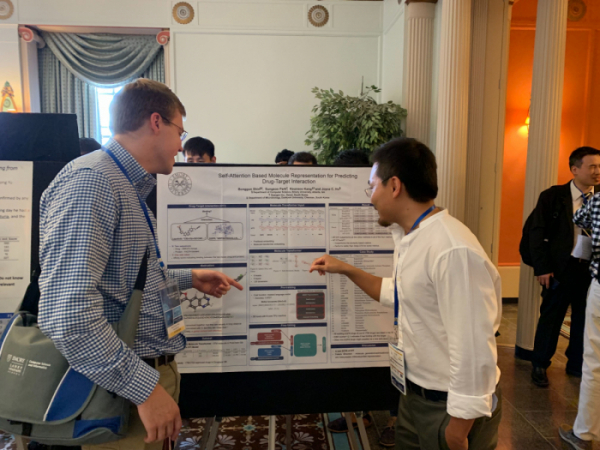기업
Deargen Unveils the Performance Results of a New Drug-Protein Interaction Prediction Model.
by Joungmin Cho
Deargen presented at MLHC 2019, "All eight FDA-approved EGFR anticancer drugs were predicted using a database of ninety-seven million chemical compounds".

Deargen, a new drug development venture company based on artificial intelligence, unveiled the performance results of its MT-DTI (Molecule Transformer Drug Target Interaction) method.
On August 12th, Deargen announced that they had presented their results at the 2019 Academic Conference for MLHC (Machine Learning for Healthcare), which was held from August 8th - 10th in Michigan, USA.
DTI, or Drug Target Interaction, is a method of deriving new drug candidates by predicting the interaction between disease-causing molecules and those of the drug candidate. However, conventional laboratory-based (in-vitro) DTI is not only prohibitively expensive and time-consuming, but is also less than 10% effective at actually resulting in the development of a new drug.
Accordingly, recently DTI using computer simulation-based (in-silico) technology is required. Various types of in-silico DTI prediction models have been suggested, but these methods have known limitations in predicting the right candidate molecules. The compounds used are insufficient, and the method used fails to fully reflect the complex chemical structures involved.
MT-DTI is a new DTI model developed by Deargen to overcome the limitations of the existing DTI prediction model. MT-DTI effectively models complex chemical structures by fully reflecting the self-attention mechanism in the model. It also increases the accuracy of the model by utilizing PubChem’s database of ninety-seven million chemical compounds to be used in pre-learning.
The company explained, “The self-attention mechanism extracts the synthesis pattern of chemical structure from the existing database of small molecular compounds, and reflects them to the model.”
To confirm the performance of MT-DTI, Deargen conducted a comparative experiment between the existing DTI model and MT-DTI. This experiment utilized two set of data - Kiba and Davis - and used four performance metrics, including CI, MSE, r^2, and AUP. The results showed excellent performance across all metrics.
Additionally, Deargen conducted an experiment where 30 EGFR target drug candidates were extracted using the MT-DTI model. This experiment utilized a drug bank containing the details of roughly 1,800 drugs approved by the FDA. Also, EGFR, a biomarker commonly used in lung cancer, was used. The results were successful; all eights EFGR target molecules approved by the FDA of the MT-DTI predicted candidate molecules were included. This experiment is further proof of the usefulness and efficacy of the MT-DTI model.
Bonggun Shin, a Chief AI Officer, said “This study confirmed the possibility that the MT-DTI model can be used as a fast and accurate platform for presenting new drug candidates. The MT-DTI model will help develop new drugs at a low cost, and will help advance the era of patient-customized medical care.”
Kang Gilsu, Deargen’s chief director, said, “Deargen is currently working with various drug development experts to develop ‘First in Class, Best in Class’ drugs by utilizing AI technology. We will try to make Deargen’s AI technology an essential tool in the development of new drugs.”
The results of the study will be included in an article titled Self-Attention Based Molecule Representation for the Prediction of Drug-Target Interaction, and will be published in The Journal of Machine Learning Research, an international journal. In this work, Deargen collaborated with the Practical Data Mining & Exploration Lab at Emory University.


















